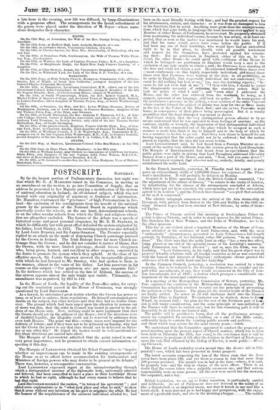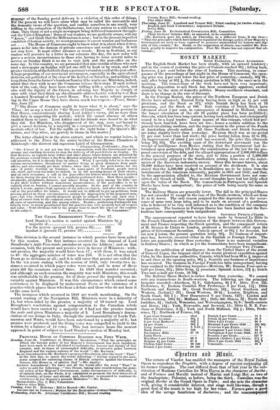British legislation, we are apt to flatter ourselves, is particularly
careful and deliberate. An act of Parliament does not descend in the midst of us like a thunderbolt or an imperial ukase, nor does it knock in our roof like a bomb-shell. A man does not go to bed happy and prosperous, with the enjoy- ment of a profitable trade, and rise in the morning a beggar The sudden
stoppage of the Sunday postal delivery is a violation of this order of things. For the present we will leave alone what may be called the mercantile and the domestic views of the question, and confine ourselves to one result, very trifling in the estimation of the Sabbatarians, but very serious to a stilllarger class. Only think of not a single newspaper being delivered tomorrow through- out the United Kingdom ! Some of our readers, we are perfectly aware, will say "Amen," and think that the Millennium is near ; but in the present imperfect condition of human society, we mustpronounce it a most wanton and barbarous stoppage of the Sunday postal delivery is a violation of this order of things. For the present we will leave alone what may be called the mercantile and the domestic views of the question, and confine ourselves to one result, very trifling in the estimation of the Sabbatarians, but very serious to a stilllarger class. Only think of not a single newspaper being delivered tomorrow through- out the United Kingdom ! Some of our readers, we are perfectly aware, will say "Amen," and think that the Millennium is near ; but in the present imperfect condition of human society, we mustpronounce it a most wanton and barbarous act The House of Commons ought to know what it is about when it tres- passes so far into the domain of private conscience and social liberty. It will not stop here. It must either advance or recede. Even in Scotland, as our readers will perceive by a letter in our columns this day, the new order will prove a serious inconvenience to those who having to come several miles to service on Sunday think it no sin to visit kirk and the post-office on the same day. In this country, we are persuaded that nine-tenths of those who now read a newspaper on Sunday will get one still by hook or by crook, and with greater violation of the Sabbath than a postman's round or a call at the post-office. A large proportion of our provincial newspapers, especially in the agricultural districta, fire published at the close of the market on Saturday, and nothing will keep them from the farmer's hand's on Sunday if he wants one. Ministers, indeed, admit that they wish to see the Commons retrace their steps. If such is their view of the case, they have been rather trifling with a serious subject, and also with the dignity of the Crown, in advising her Majesty to comply at once with what they think an objectionable address hastily voted by less than a hundred Members of the Lower House. For a far more solemn proceed- ing in the Upper House they have shown much less respect.—Times, Satur- day, June 22: ' T" The House of Commons ought to know what it is about," says the Times : let us say a word for "the House of Commons." Certain persons in that House, conscientiously sharing Lord Ashley's views, did no more than their duty in supporting his motion; which the casual absence of others enabled them to carry. Lord Ashley and his friends were bound to do what they did. But Ministers, who disapproved of the step, were not bound to give a casual decision, by a majority in a comparatively thin House, the im- mediate effect of law. Put the saddle on the right horse : the Queen's Mi- nisters, and they alone, are gravely to blame in this matter.] The letter alluded to in the above extract, and which we reprint below, is addressed to the Times by the senior brother of the Messrs. Chambers of Edinburgh—the discreet and sagacious Laird of Glenmoriston.
" Glenmoriston, Peebksshire, June 19.
" Sir—I trust it is not yet too late to remonstrate with the Government on the strange and startling decision to stop the delivery of all post-letters on Sunday. To that decision, as regards large towns and other places where letters are delivered by the postman several times a day from Monday morning till Saturday night, I need not call attention, for it is already done by others. What. I specially refer to is the very serious inconvenience threatened to parties living at great distances from post- offices, and who usually get their letters when they visit the post-towns for the sake of public worship on Sundays. In many parts of Scotland, people travel six, eight, and even ten miles to church, or to the meeting-house of their choice; and on such occasions, a call at the post-office for letters which may have arrived for them during the past week is a regularly-performed duty. How these people— shepherds, ploughmen, fanners, and others hying far away among the hills—are to get their letters without monstrous inconvenience, if the post-office is to be entirely shut on Sunday, I cannot possibly imagine. In the part of the country in which I reside, parties walk upwards of six miles to church, and after divine service call at the post-office for letters. It would not be difficult to get up petitions from persons placed in these circumstances, urging the impropriety of the proposed mea- sure; but why should quietly-disposed people be obliged to take any such step ? They of course look to the common sense of the Government to protect them against all sorts of oppression, and this among others. Besides, petitioning Parliament has latterly been so much prostituted that the practice has very properly lost all respect and value. • Next elections will be the proper time to show the sense of the country
on the subject. I am, &c. W. CHAMBERS."



























 Previous page
Previous page